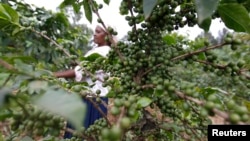A quarter of Kenya's population are farmers. Few of these 10 million have ever received training on how to improve their production or how to expand their businesses with financing. Most of these farmers shun the idea of a loan after seeing neighbors lose livestock or whole farms when they can't keep up with repayments to loan sharks.
Now a new company is offering cash for conservation measures, though, in the hope that so-called "green loans" will help farmers with better borrowing terms, while teaching them how to protect Kenya's most fertile soils and ensure that the country can keep feeding itself.
Fifty-year-old Samuel Karioki has been farming since he left school, harvesting the same vegetable crop each season.
But this year, Karioki's neat rows of cabbages are bursting into one another, and he is expecting a bumper crop of potatoes.
Micro financing
After years of struggle, his success is thanks to a $90 loan that he used to buy top quality seeds and fertilizer for the first time.
"We've had a lot of problems," he said noting a lack of finances, then a lack of market and then infestations of bugs and diseases. He said he never wanted to take a loan before that because there's always so much collateral.
Karioki has seen farmers in this mountainous region, a couple of hours outside Kenya's capital Nairobi, lose everything to loan sharks after failing to keep up with repayments.
His experience was different, however, because of a new micro finance company called F3 Life. It offers small cash loans starting from as little as $20 to as high as $180 dollars, depending on repayments and the completion of basic conservation practices.
The scheme, designed by conservationist Mark Ellis-Jones, includes free monthly training in farming aimed at boosting productivity.
"We also provide a loan where we peg the interest rates to the quality of soil conservation that a farmer is practicing. We ask farmers to build grass strips across the contours of their slopes, which prevents the loss of top soil from their farms," said Ellis-Jones.
As the loans increase, farmers are asked to plant trees to increase the protection of fertile top soils from being washed away. F3 Life said such simple measures can extend the soil life from about 20 years to 1,000 years.
In this area, where vast patches of brown dot the once verdant hillsides, the soils might last only another decade.
Preserving soils
Continuing land degradation could pose serious problems for a growing country's ability to feed its inhabitants. Over the past 50 years, the world has lost one third of its arable soils.
F3 Life agronomist Ngigi Obadiah said he hopes to roll out nationwide the "green loans" pilot plan in an effort to save Kenya's soils as the population booms.
"At the moment we are servicing 52 clients. We are anticipating to increase the number to 350 in one year's time. In two years' time we anticipate up to 10,000, and half a million in the next five years," said Obadiah.
Samuel Karioki said his cabbages are the talk of the town, and many farmers already are sold on the idea of green loans that can help the entire community.
As profits grow higher than the tall grasses protecting his plot, he plans to buy a pickup truck. That will enable him to cut out the middlemen who make a small fortune selling farmers' produce at a market, which now will soon be in his reach.











